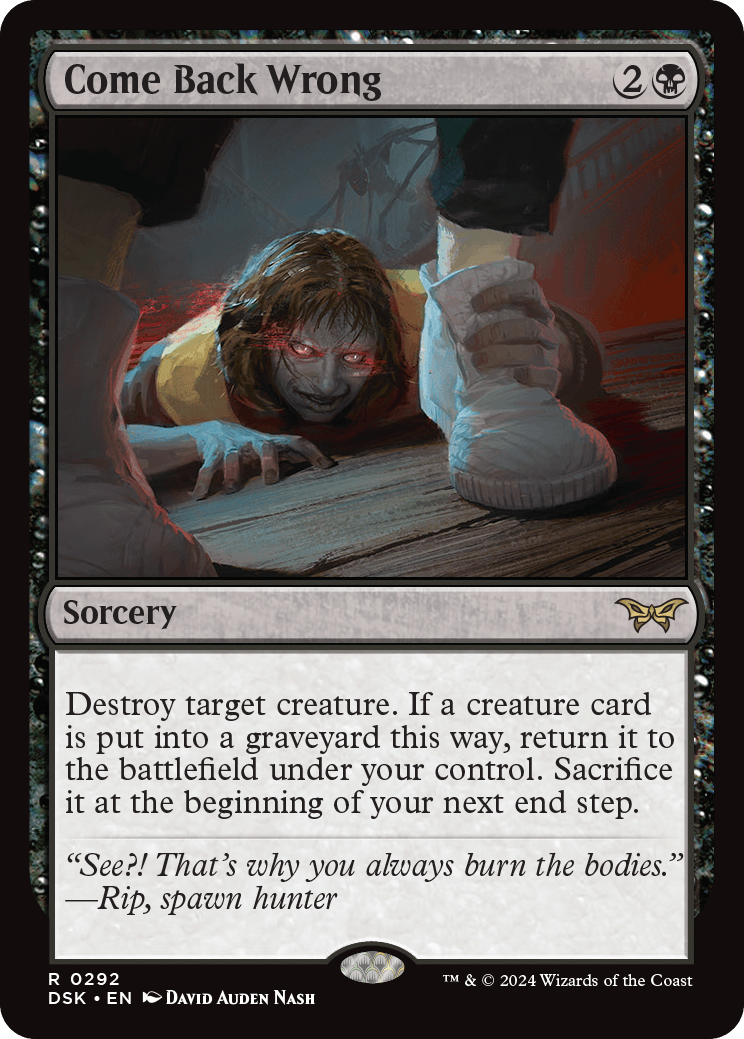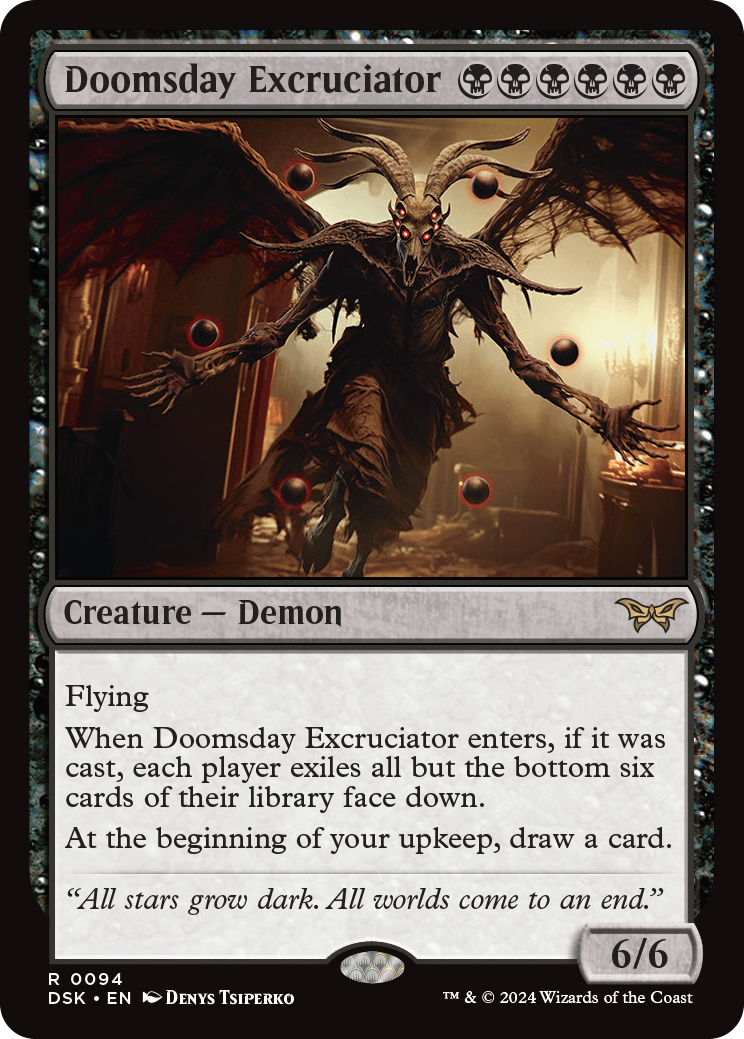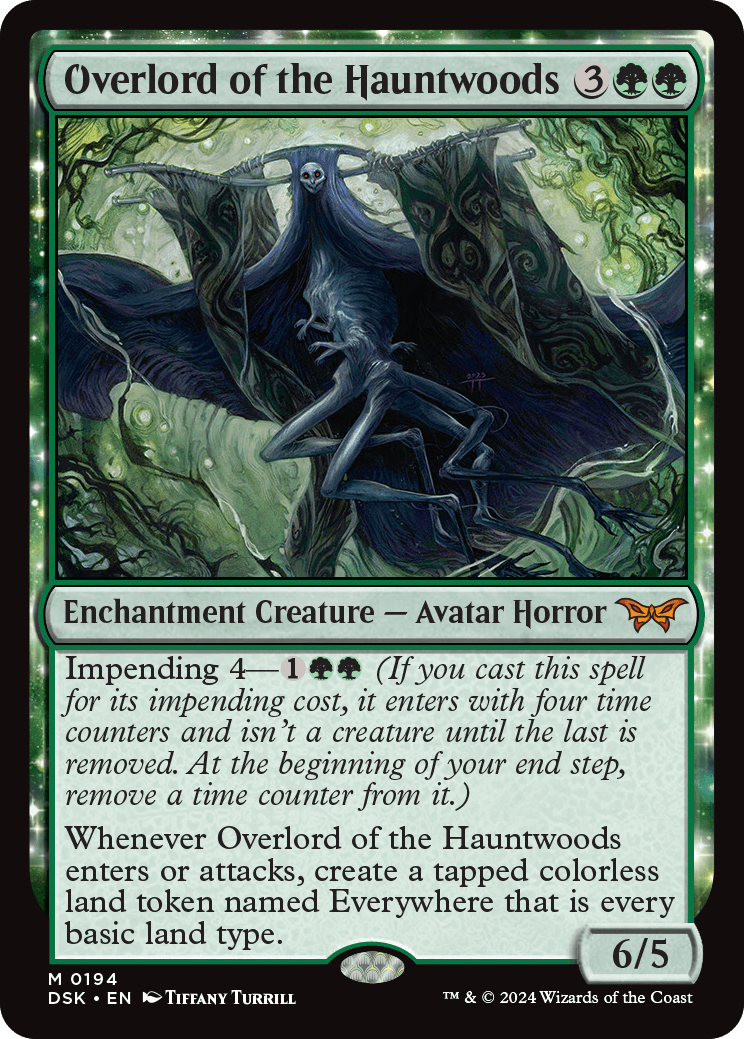Valgavoth and his whole house of creepy creatures have arrived, bringing a slew of new cards to evaluate! This set is mostly made of straightforward cards… But there are always a few surprises. We’ve detailed which cards to watch out for, why, and how to remedy any errors that come up. If you want to navigate the House, be sure you read carefully!
And before we dive in, don’t forget, the Infraction Procedure Guide just got an update! You can read about those changes in Toby’s article here, or you can check out the handful of Duskmourn cards affected by these changes at the bottom of this page.
Seven cards have one or more triggers that upgrade to a Warning when missed:
“When Unidentified Hovership leaves the battlefield, the exiled card’s owner manifests dread.”
The creature that gets abducted exiled doesn’t ever come back… But manifesting dread as a consolation prize will generally benefit the opponent. Since the player who controls this trigger isn’t the one taking actions when it resolves, it’s an easy one to miss.
“Whenever you lose life, discard that many cards. Then if you have no cards in hand, you lose the game.”
Discarding cards and losing the game are both definitely detrimental! Missing this trigger can dramatically change the outcome of a match, and unlike a Game Rules Violation, there’s no partial fix to apply if it’s been more than a turn since the controller forgot to discard cards. Judges should step in quickly if they believe this trigger may have been missed.

“[destroy, then reanimate a creature]. Sacrifice it at the beginning of your next end step.”
This card is the best of both a kill spell and a Threaten effect! Because the borrowed creature changes zones and the same effect that moved it sets up the sacrifice later, that delayed trigger is “undoing a zone change”. So no matter how many turns have passed there will always be a remedy to apply: the opponent chooses to resolve that sacrifice trigger either immediately or at the start of the next phase.
“Whenever you cast an instant or sorcery spell, put a time counter on Cursed Recording. Then if there are seven or more time counters on it, remove those counters and it deals 20 damage to you.”
20 is a lot of damage! A lethal amount, in most games, and that’s clearly detrimental.
“[create a token]. Sacrifice it at the beginning of the next end step.”
Anyone who’s ever been to the carnival can tell you that balloons only last so long. And since creating a token is grouped with effects that move cards to the battlefield from other zones, popping these balloons at the beginning of the end step counts as undoing a zone change. Just like with Come Back Wrong, this remedy can never expire.
“Whenever Attack-in-the-Box attacks, you may have it get +4/+0 until end of turn. If you do, sacrifice it at the beginning of the next end step.”
This creature is full of surprises! While this sacrifice trigger is worded the same as the ones we’ve seen so far, it’s handled a bit differently – since the trigger condition is choosing the power boost, not a zone change, it doesn’t fall into a special remedy. If it’s been more than a turn since the trigger was missed, there’s no remedy to apply and the game moves on.
“[you may have Phantasmal Image copy a creature, except] … it has ‘When this creature becomes the target of a spell or ability, sacrifice it.”
Appearing as a special guest in Duskmourn boosters doesn’t re-introduce this card to Standard, but it’s still something to watch for in draft and sealed events. That also happens to be where this trigger is most detrimental to its controller! Upgrading the opponent’s combat tricks (or any other spell or ability that targets a creature) into removal is a significant downside to this clone effect.
Two notable cards have a trigger that does NOT upgrade when missed:
“When Fear of Abduction leaves the battlefield, put each card exiled with it into its owner’s hand.”
This card looks an awful lot like an Oblivion Ring type, but considering the printed card as a whole paints a slightly different picture. Since its controller has to exile their own creature as an additional cost – and gets that creature back as part of this trigger – it isn’t clear whether this ‘return’ trigger is detrimental or not.
To know for sure, the judge would have to evaluate which exiled creature is “better” than the other, and subjective evaluations like that only lead to inconsistency in policy. Since Missed Trigger penalties only upgrade to a Warning if the trigger is generally detrimental and there isn’t a general answer here, it doesn’t upgrade.

“At the beginning of your upkeep, draw a card.”
This trigger would be obviously helpful on any other card, but after the Excruciator’s first trigger exiles all but the bottom 6 cards of the library, drawing extra cards gets more dangerous. If nothing else happens, the opponent will deck out after 6 turns… And the demon’s controller will deck out after only 3 turns!
While specific board states and any other cards played alongside it can’t be part of evaluating its trigger, though, it is still a 6/6 flier. That does a good job of ending games on its own, and drawing six cards to the opponent’s three can definitely help! Plus, if the opponent wants this trigger to be a drawback, they have to let it resolve at least once and then have some way to destroy the Excruciator or survive its attack, and deal with whatever the bonus card is.
Putting everything together: this trigger is clearly a risk. But it’s a powerful benefit; games will generally end faster thanks to the bonus cards, before the drawback catches up; and their opponent only has a short window to turn that trigger back on them. Since it isn’t clear that this trigger is detrimental in most cases, it won’t upgrade to a Warning when missed.
Other notable cards and mechanics:

1. Creatures with Impending
“If you cast this spell for its impending cost, it enters with four time counters and isn’t a creature until the last is removed. At the beginning of your end step, remove a time counter from it.”
Exactly five creatures have this keyword, which includes a trigger at the beginning of the end step. Removing time counters will always benefit the controller here, so missing this trigger won’t upgrade. But an important note to remember: “pass the turn” or other shortcuts that jump to the end of the turn don’t mean this trigger is missed!
“Pass”, “your turn”, “go”, and similar shortcuts all jump to the same place; when the non-active player has priority during the active player’s end step. At this point the Impending creature’s trigger could still be on the stack! If the opponent accepts the shortcut by starting their turn and untapping their permanents, the active player still has a short window to acknowledge the trigger by immediately removing a time counter.
2. Creatures with Survival
“At the beginning of your second main phase, if [this creature] is tapped, [do something].”
Every “Survival” ability is different, but they all begin with the same trigger condition, and they all include the same “intervening if” clause. That means these creatures have to be tapped as the second main phase starts for the ability to trigger at all, and they have to still be tapped when it’s time for the trigger to resolve. If a creature leaves the battlefield before its Survival ability resolves, check its last known information to see if it was tapped just before it left the field to decide if the ability resolves!
3. Acrobatic Cheerleader, Enduring Innocence, and Defiled Crypt
“This ability triggers only once (each turn).”
Finally, we get to some of the cards affected by the recent IPG changes! In recent years, templates have started including trigger restrictions more and more – phrases like “this triggers only once each turn”. Missed triggers policy has been updated to clarify that a missed trigger does count against this limit! So if a player misses their card from Enduring Innocence or their token from Defiled Crypt, they can’t get that trigger again later in the same turn. Acrobatic Cheerleader is even more punishing – a player who misses that card’s Survival trigger won’t get it again for the rest of the game!
Note that this only applies if a template cares how many times an ability has triggered or can trigger. This doesn’t affect cards like Vito, Fanatic of Aclazotz or Omnath, Locus of Creation that care about how many times an ability has resolved! It also doesn’t impact templates like Irreverent Gremlin that offer an optional action with the restriction “[d]o this only once each turn”. That limit is tied to making that choice, not to the trigger as a whole.
“(… after your draw step, add a lore counter.)”
The second update to missed trigger policy this set impacts Sagas. Previously, missing the turn-based action to add a lore counter to your Sagas was categorized as a Game Rules Violation. Players received a Warning for missing those counters, their opponents were required to help remember the turn-based action, and judges remedied the mistake by rewinding the game to the start of the main phase when the counter was missed.
However… Lore counters mostly exist to make tracking a Saga’s chapter triggers easier with a physical object. The chapter triggers are the part that matters much more than the counters. So moving forward, a player missing their lore counters is treated as a missed triggers issue! That means players no longer receive a Warning for forgetting their Sagas; their opponents aren’t required to remind them anymore, though sometimes they may want to anyways; and rather than rewind the game to remedy the mistake, judges ask the opponent to either ignore that lore counter for the turn or add it once the error is noticed.
As always, thank you for joining us! We hope this survival guide has served you well. We’ll be back to basics soon with the upcoming Foundations set, bringing Standard a healthy sample of classic cards from across the years along with plenty of brand new staples. We’ll see you then!
